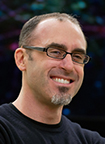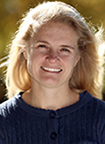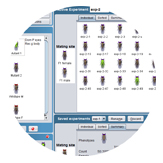
 Dr. Paul Lipton and Meredith Knight
Dr. Paul Lipton and Meredith Knight
Title: Bridging the Gap, from Classroom to Bench
Group Meeting Date & Time: Friday, January 24, 2014 @ 2:00 pm
View the slides from Dr. Lipton’s and Meredith Knight’s Group Meeting
Dr. Paul Lipton, the director of Boston University’s Undergraduate Program in Neuroscience and the Program Director of BU’s HHMI Undergraduate Science Education Program, and Meredith Knight, a science educator and educational researcher who is currently a doctoral candidate in science education at Boston University, gave a group meeting titled: “Bridging the Gap, from Bench to Classroom.” The focus of their group meeting was on the new undergraduate neuroscience program at Boston University and its effectiveness in developing scientifically literate neuroscience undergraduates. The new neuroscience program was launched in 2008 with an initial enrollment of 50 undergraduates. The program has since grown to 350 students, which corresponds to approximately 90 students per year, and now has Howard Hughes Medical Institute funding as well.
The goal of the undergraduate neuroscience program is to develop and train undergraduates to be scientifically literate. To meet this goal, Paul focused on three main questions when thinking about the program’s curriculum: 1) Should research be a/the goal?, 2) Does a lab course equal research?, and 3) … The Gap. In particular, when thinking about The Gap, what is the relationship between a lab course and research conducted in a laboratory? As a result, the undergraduate neuroscience program was structured to include basic science courses, including biology, chemistry, physics and math, with strong laboratory components. The core lab courses are NE102, a freshman-level cellular and molecular neurobiology course, and NE203, a sophomore-level principles of neuroscience course. Following completion of the core lab courses, students take electives, conduct research, and specialize to ultimately become science literate and skilled neuroscience graduates.
Meredith Knight, a doctoral candidate within Boston University’s School of Education, has focused her research on two questions regarding the undergraduate neuroscience program: 1) What is the effect of the lab classes on student’s research experience? and 2) What is the effect of research on student’s academic experience? Using multiple assessment methods, included graduating senior surveys, mentor surveys, and focus groups, Meredith has demonstrated that the lab classes allow students to learn laboratory skills and prepare them for their research experiences. Mentors support these findings and report that students who have taken laboratory courses, in particular NE102, have greater gains in their summer research programs. Her research also demonstrates that students’ research experiences positively affect their coursework. And, in addition to addressing the research questions, Meredith’s research into the effectiveness of the new undergraduate neuroscience program demonstrates that the neuroscience program allows students to clarify their career goals and expectations.
Now that the neuroscience program has been launched successfully, Meredith and Paul are turning their focus toward bridging the gap between the research bench and laboratory courses. In addition to increasing the focus on project-based laboratory projects and primary literature analysis, Boston University is considering the development of an Integrated Science Experience (I.S.E.) to bring together chemistry, biology, and neuroscience in freshman and sophomore laboratory courses. The goals of the new integrated science curriculum would be to improve retention, establish a community of undergraduate scientists, prepare future STEM faculty, and increase the participation of research-focused faculty members in the undergraduate program. Through this program, neuroscience undergraduates will have the opportunity to learn through intensive research experiences and pursue future science career opportunities.
Speaker Biographies
Dr. Paul Lipton is the Director of Boston University’s Undergraduate Program in Neuroscience, and Program Director for BU’s HHMI Undergraduate Science Education Program. He is a founding member of the major, and has overseen its growth from 30 students at its inception in the fall of 2008, to almost 350 students today. Paul is the primary academic advisor for the major. He teaches and develops new lecture and lab courses for the program, oversees a set of High School Outreach programs targeted at students enrolled in the Boston Public Schools, serves as faculty advisor to the Mind and Brain Society, and publishes their student magazine, The Nerve. Formerly an active member of the Laboratory for Cognitive Neurobiology (headed by Professor Howard Eichenbaum, Director of the Undergraduate Program in Neuroscience), Paul’s research was focused on the neural circuitry of learning and memory. Paul is currently working on incorporating new pedagogies into the curriculum and, together with Meredith Knight (a doctoral student in Boston University’s School of Education), validating assessment methods for the program’s new courses and curricular revisions.
Meredith Thompson Knight is a science educator and educational researcher with a foundation in science and educational research techniques. She has a bachelor’s degree in chemistry from Cornell University, a master’s degree in science and engineering education from Tufts University, and is currently a doctoral candidate in science education at Boston University. She has experience both in laboratory research and in education research, and has learned first hand that education research can be challenging because “people are not petri dishes!”. She has conducted education research as part of a team for a large-scale, national studies, and has experience designing and implementing a number of smaller scale evaluations for educational programs at the K-16 level. She has served as the program evaluator for the HHMI sponsored neuroscience program at BU since Fall of 2011, and has enjoyed the opportunity to think about learning from a neuroscience perspective.



